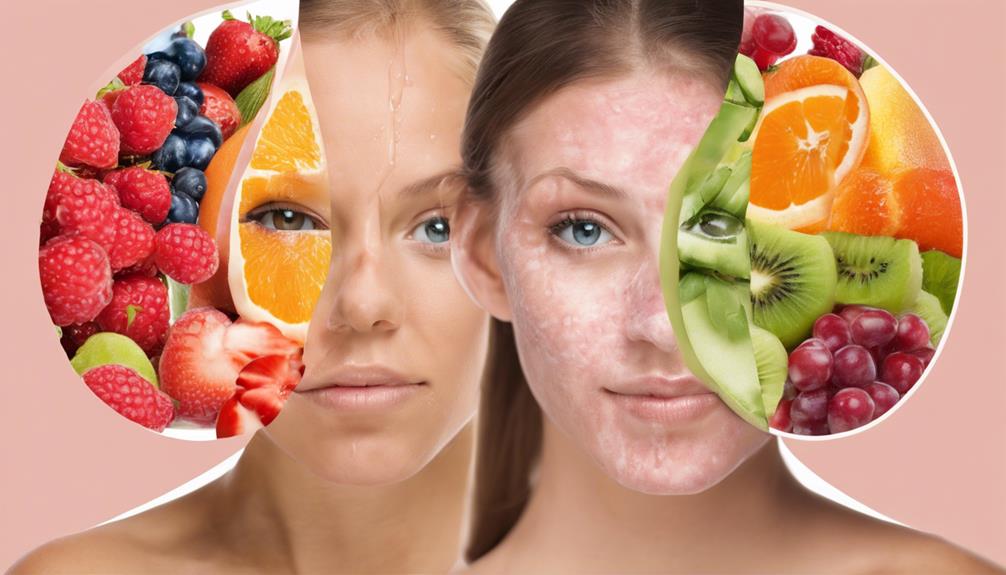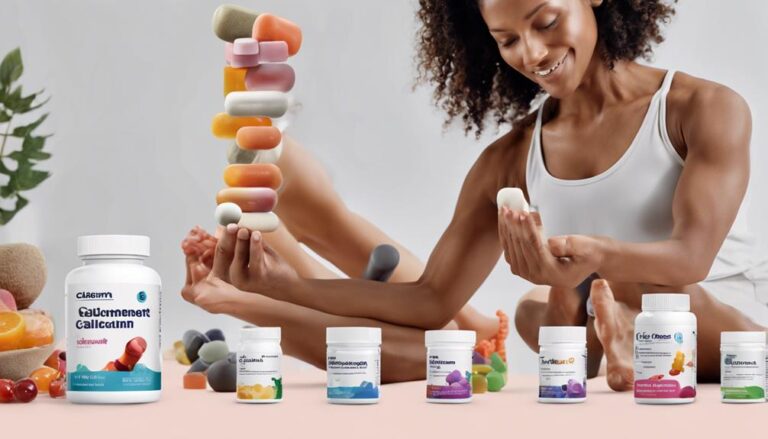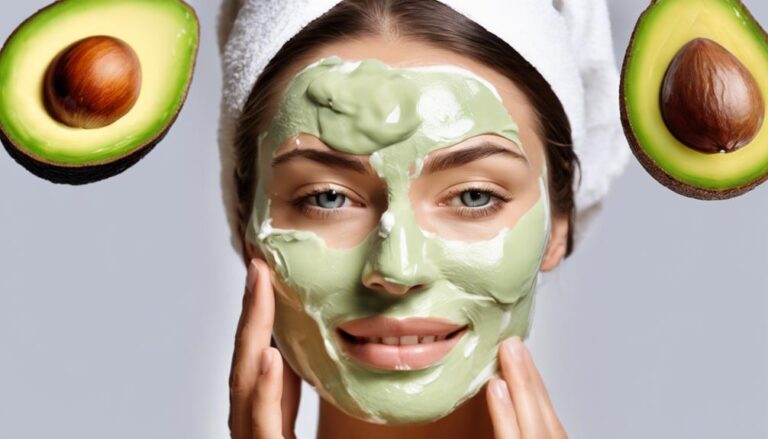The Link Between Diet and Women’s Skin Health
Did you know that what you eat can significantly impact the health and appearance of your skin? The connection between your diet and skin health goes beyond just surface-level care. By making mindful choices about the foods you consume, you can support your skin from the inside out, addressing concerns like acne, aging, and overall radiance. So, next time you reach for a snack or plan your meals, consider how your choices could be influencing your skin's health and beauty.
Importance of Nutrient-Rich Foods
To maintain healthy skin, incorporating a variety of nutrient-rich foods into your diet is essential. Superfood benefits are plentiful when it comes to skin health.
Foods like blueberries, walnuts, and avocados are packed with antioxidants that protect your skin from damage caused by free radicals. These superfoods also contain essential fatty acids that help maintain skin elasticity and hydration, promoting a youthful appearance.
In addition to superfoods, incorporating foods rich in skin-friendly nutrients like vitamin C, E, and A can further enhance your skin's health.
Vitamin C, found in citrus fruits and bell peppers, aids in collagen production, which keeps your skin firm and reduces the appearance of wrinkles.
Vitamin E, abundant in almonds and spinach, acts as a powerful antioxidant, protecting your skin from sun damage.
Vitamin A, present in sweet potatoes and carrots, supports skin cell turnover, promoting a radiant complexion.
Impact of Hydration on Skin
Maintaining optimal hydration levels is crucial for promoting healthy skin. Water intake plays a significant role in skin hydration, influencing its elasticity, texture, and overall appearance. When you stay well-hydrated, your skin is more likely to look plump, radiant, and youthful. Dehydration can lead to dryness, dullness, and even exacerbate skin conditions like acne or eczema.
To emphasize the importance of hydration for skin health, let's take a look at the following table:
| Benefits of Hydration for Skin | |
|---|---|
| Hydrated Skin | Healthy Glow |
| Improved Elasticity | Reduced Wrinkles |
Role of Antioxidants in Skin Health
Ensuring your skin receives adequate protection and support is essential for overall skin health. Antioxidants play a crucial role in maintaining skin elasticity and promoting collagen production. These powerful compounds help neutralize free radicals, which are unstable molecules that can damage skin cells and accelerate aging. By incorporating antioxidant-rich foods into your diet, such as berries, nuts, seeds, and leafy greens, you can help combat oxidative stress and support your skin's health and vitality.
Antioxidants work by reducing inflammation, protecting against UV damage, and promoting skin repair and regeneration. By supporting collagen production, antioxidants help maintain skin elasticity, firmness, and overall youthfulness. Vitamins C and E, as well as compounds like flavonoids and carotenoids, are known for their antioxidant properties and skin benefits.
Incorporating a variety of antioxidant-rich foods in your diet can help you achieve healthy, glowing skin from the inside out. Remember, a balanced diet rich in antioxidants is key to supporting your skin's health and appearance.
Influence of Sugar and Processed Foods
The impact of sugar and processed foods on your skin health can't be understated. High sugar intake can lead to a process called glycation, where sugar molecules attach to proteins like collagen and elastin, causing them to become stiff and less flexible. This process contributes to the formation of wrinkles and sagging skin, accelerating the aging process. Additionally, sugary foods can trigger inflammation in the body, exacerbating skin conditions such as acne and rosacea.
Processed foods, on the other hand, are often high in refined carbohydrates, unhealthy fats, and additives that can disrupt your skin's natural balance. These foods have a high glycemic index, causing spikes in blood sugar levels that can lead to increased oil production and inflammation in the skin.
To maintain healthy skin, it's essential to limit your sugar intake and opt for whole, unprocessed foods rich in vitamins, minerals, and antioxidants. By making mindful choices in your diet, you can support your skin's health and radiance from the inside out.
Benefits of Omega-3 Fatty Acids
Omega-3 fatty acids play a crucial role in promoting optimal skin health and overall well-being. These essential fats are renowned for their ability to enhance skin elasticity, keeping it supple and youthful.
By incorporating omega-3 fatty acids into your diet through sources like fatty fish, flaxseeds, and walnuts, you can support your skin's natural barrier function, which is vital for retaining moisture and protecting against external aggressors.
Furthermore, omega-3 fatty acids are known for their anti-inflammatory properties, aiding in the reduction of skin inflammation. Inflammation is a key factor in various skin conditions such as acne, eczema, and psoriasis.
By including omega-3 fatty acids in your diet, you may help alleviate these inflammatory skin issues and promote a clearer complexion.
To reap the benefits of omega-3 fatty acids for your skin, aim to incorporate them into your meals regularly. Whether through dietary sources or supplements, prioritizing these essential fats can contribute to healthier, more radiant skin from the inside out.
Connection Between Gut Health and Skin
Optimizing your gut health can have a significant impact on the condition of your skin. The gut microbiota plays a crucial role in maintaining overall health, and emerging research suggests that it also influences the skin microbiome.
The gut-skin axis is a complex network of interactions between the gastrointestinal system and the skin. Imbalances in the gut microbiota can lead to inflammation, which may manifest as various skin conditions such as acne, eczema, or psoriasis.
A healthy gut microbiota helps regulate the immune response and maintain skin homeostasis. Probiotics, prebiotics, and a diverse range of fiber-rich foods can support a flourishing gut microbiota, potentially improving skin health.
On the contrary, diets high in processed foods and sugars can disrupt the gut microbiota balance, contributing to skin issues.
Effects of Dairy Products on Skin
Improving your skin health involves considering the impact of various dietary choices, including the consumption of dairy products. When it comes to the effects of dairy on your skin, it's essential to be aware of its potential role as an acne trigger and its influence on hormonal balance.
Dairy products have been associated with acne triggers due to their ability to increase insulin levels, leading to inflammation and excess sebum production in the skin. This can exacerbate existing acne or contribute to new breakouts.
Additionally, dairy contains hormones such as estrogen and progesterone, which can disrupt your hormonal balance. Imbalances in hormones like these may manifest on your skin, causing issues like acne flare-ups or skin sensitivity.
Being mindful of your dairy intake and its impact on your skin can help you make informed decisions about your diet and skincare routine. If you notice a correlation between dairy consumption and skin issues, consider reducing your intake or opting for dairy alternatives to support healthier skin.
Power of Vitamins and Minerals
Considering the significant impact of dietary choices on skin health, a key aspect to focus on is the power of vitamins and minerals.
When it comes to achieving radiant skin, the role of skin supplements can't be underestimated. Incorporating the right vitamins and minerals into your diet can work wonders for your skin's health and appearance. Here are three essential nutrients for glowing skin:
- Vitamin C: Known for its antioxidant properties, vitamin C helps in collagen production, skin repair, and protection against sun damage.
- Vitamin E: Another powerful antioxidant, vitamin E aids in moisturizing the skin, reducing inflammation, and promoting skin healing.
- Zinc: This mineral plays a crucial role in regulating oil production, reducing acne, and supporting overall skin health.
To maintain healthy skin, strive for dietary balance by including a variety of fruits, vegetables, whole grains, lean proteins, and healthy fats in your meals. Remember, what you eat directly impacts your skin's vitality.
Link Between Alcohol and Skin Aging
Alcohol consumption has been found to have a direct correlation with skin aging. Research indicates that alcohol intake can lead to collagen degradation, a process essential for maintaining skin elasticity. Collagen is a protein that provides structure to the skin, promoting its firmness and smoothness. When collagen breaks down due to factors like alcohol consumption, skin elasticity decreases, contributing to the development of wrinkles and fine lines.
Alcohol's impact on skin aging is primarily attributed to its ability to generate free radicals, unstable molecules that can damage skin cells and accelerate aging processes. Additionally, alcohol can dehydrate the skin, leading to a dull complexion and exacerbating the appearance of aging signs.
To maintain skin health and prevent premature aging, it's important to moderate alcohol consumption and prioritize hydration. By reducing alcohol intake and ensuring adequate hydration, you can support collagen production and preserve skin elasticity, promoting a more youthful and radiant complexion.
Considerations for Healthy Skin Diet
When it comes to maintaining healthy skin, a balanced and nutrient-rich diet plays a crucial role. Ensuring that you consume the right foods can positively impact your skin health by supporting hormonal balance and nurturing a healthy skin microbiome.
Here are three key considerations for a diet that promotes glowing skin:
- Hormonal Balance: Consuming foods rich in omega-3 fatty acids, such as salmon and chia seeds, can help regulate hormones like estrogen and testosterone, which are essential for healthy skin.
- Skin Microbiome: Including probiotic-rich foods like yogurt and kefir in your diet can support a diverse and balanced skin microbiome. This can help prevent skin conditions like acne and eczema by promoting a healthy bacterial environment on your skin.
- Antioxidant-Rich Foods: Incorporating colorful fruits and vegetables like berries, spinach, and bell peppers can provide your skin with essential antioxidants that protect against damage from free radicals and promote skin repair and regeneration.
Frequently Asked Questions
Can Specific Foods Worsen Acne Breakouts?
Yes, specific foods like sugar and dairy can worsen acne breakouts. Cutting back on sugar intake and dairy products may help improve your skin health. Consider monitoring your diet to see if these changes make a difference.
How Does Caffeine Consumption Affect Skin Health?
When you consume caffeine, like green tea, it can impact your skin health. Caffeine may lead to dehydration, affecting your skin's hydration levels. To maintain healthy skin, balance your caffeine intake with proper hydration for optimal results.
Are There Any Dietary Triggers for Rosacea?
If you're wondering about dietary triggers for rosacea, consider dairy sensitivity and sugar intake. Research suggests these factors may exacerbate symptoms. Pay attention to how your body responds to these foods for potential skin improvements.
Does Intermittent Fasting Impact Skin Appearance?
Hey there! Intermittent fasting can impact skin appearance. Remember the importance of staying hydrated and keeping an eye on your sugar intake. These factors can play a role in how your skin looks and feels.
Can a Vegan Diet Provide All Necessary Skin Nutrients?
A vegan diet can supply skin nutrients with proper planning. Incorporate omega-3 supplements for fatty acids and include antioxidant-rich foods like berries and leafy greens. Consult a healthcare provider for personalized advice on meeting skin health needs.
Conclusion
As you savor that refreshing glass of water, remember the impact of those sugary treats on your skin. Opt for nutrient-rich foods over processed snacks to nurture your skin from within. Balance is key when it comes to maintaining a healthy diet for radiant skin. So, while that occasional indulgence may be tempting, choose wisely for the long-term health and vibrancy of your skin. Prioritize your skin's well-being by making mindful choices every day.














